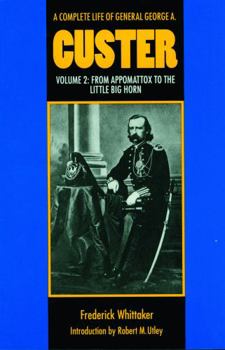A Complete Life of General George A. Custer, Volume 2: From Appomattox to the Little Big Horn
Select Format
Select Condition 
Book Overview
This first biography of General George A. Custer was published late in 1876, only months after the disaster at the Battle of the Little Big Horn. A Complete Life was the beginning of a legend, and Frderick Whittaker did more than anyone else except Libby Custer to make the flamboyant Boy General a permanent resident of the national consciousness. Quite aside from its contribution to the public image of Custer, this important book placed him and his associates against a concrete background of onrushing events. Drawing on newspaper reports and the general's own words, Whittaker captures the excitement of the era. Continuing the story of Custer from Volume 1, which dealt with his childhood in Ohio, cadetship at West Point, courtship of Elizabeth Bacon, and service as a cavalryman in the Civil War, Volume 2 takes Custer west to head up the newly created Seventh Cavalry and fight the Arapahoes, Cheyennes, Kiowas, and Sioux. Whittaker gives full scope to Custer's brushes with authority, his changeable relations with his troops, and his famous expeditions, ending with a memorable description of his last stand at the Little Big Horn in June 1876.
Format:Paperback
Language:English
ISBN:0803297432
ISBN13:9780803297432
Release Date:March 1993
Publisher:Bison Books
Length:314 Pages
Weight:0.15 lbs.
Dimensions:0.7" x 5.3" x 8.0"
Customer Reviews
2 ratings
I just want to share summaries with other costomers
Published by Thriftbooks.com User , 22 years ago
I just want to share summaries with other costomers
Informative; Authentic; Required reading for Custerophiles!
Published by Thriftbooks.com User , 26 years ago
Published six months after Custer's death, Frederick Whittaker's "A Complete Life of General George A. Custer" traces the American icon's life from his boyhood in Ohio through his cadet years at West Point, his Civil War exploits, his impressive rise to the rank of Major General of cavalry in the Army of the Potomac and his transition to the peacetime army. All the foundation elements of the Custer story are stated in Vol. I of Whittaker's book. They are supported by the first person accounts of Custer and other of his peers, and in my opinion, clearly define the reasons for Custer being rightfully considered a genuine, homegrown American hero based on his Civil War exploits alone! [See also: "Custer Victorious"/Urwin; "Custer and His Wolverines"/Longacre; "Touched by Fire"/Barnett] My reading of this book was enriched by the fact that, as a Custer contemporary, Whittaker was not only in touch with the the 19th century ambience, but that he had the added advantages of active service as a trooper in the 6th New York Cavalry and access to Custer's papers, Civil War memoirs and personal anecdotes through his collaboration with Custer's widow, Elizabeth. As a result, the book is replete with knowledgeable commentaries on the customs, mores and military standards of the times. Of special interest to me were the final three chapters devoted to Custer's transition from the wartime to the peacetime army [Book Six, Chapters 1-3]. In these chapters Whittaker gives a clear and perceptive overview of the postwar military structure; the social psychology of the men Custer would come to command; the negative public perception of the postwar enlistee; the deficiencies in the formation of the 7th Cavalry; and the intense political intrigues which seem to surround and infect the military, particularly in peacetime. [For a contemporary example, see "Patton: A Genius for War"/D'Este]. In a clear and interesting fashion Whittaker enunciates the undercurrents which produced the "four D's" (demoralization; disobedience; dipsomania; desertion) which Custer had no part in creating but over which he was expected to exert appropriate control. Whittaker makes it clear that it was Custer's efforts in this direction, coupled with his own naivete, that set the stage for many of his future difficulties with the command structure. Whittaker's "A Complete Life of General George A. Custer" is the spiritual and intellectual great granddaddy of most subsequent writings on the subject. I found that, in spite of its venerability, the book is still productive of provocative thought pieces. As an example, it contains perhaps the first published mention of Custer having been offered a full colonelcy in the 9th Cavalry, a black regiment, which he allegedly refused , ". . .preferring a lower step to a lower grade of service. . ." One may speculate as to how the acceptance of that command might have influenced Custer's subsequent career. In this





